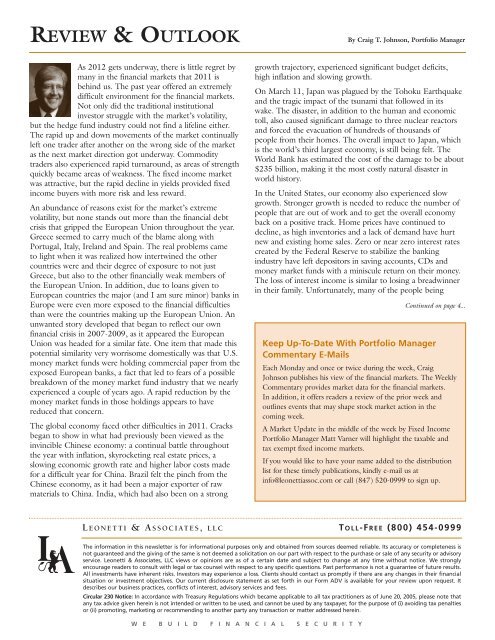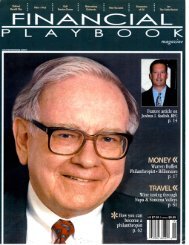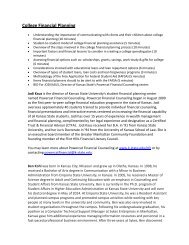A FDIC CHEAT SHEET - Leonetti & Associates LLC
A FDIC CHEAT SHEET - Leonetti & Associates LLC
A FDIC CHEAT SHEET - Leonetti & Associates LLC
Create successful ePaper yourself
Turn your PDF publications into a flip-book with our unique Google optimized e-Paper software.
REVIEW & OUTLOOK<br />
By Craig T. Johnson, Portfolio Manager<br />
As 2012 gets underway, there is little regret by<br />
many in the financial markets that 2011 is<br />
behind us. The past year offered an extremely<br />
difficult environment for the financial markets.<br />
Not only did the traditional institutional<br />
investor struggle with the market’s volatility,<br />
but the hedge fund industry could not find a lifeline either.<br />
The rapid up and down movements of the market continually<br />
left one trader after another on the wrong side of the market<br />
as the next market direction got underway. Commodity<br />
traders also experienced rapid turnaround, as areas of strength<br />
quickly became areas of weakness. The fixed income market<br />
was attractive, but the rapid decline in yields provided fixed<br />
income buyers with more risk and less reward.<br />
An abundance of reasons exist for the market’s extreme<br />
volatility, but none stands out more than the financial debt<br />
crisis that gripped the European Union throughout the year.<br />
Greece seemed to carry much of the blame along with<br />
Portugal, Italy, Ireland and Spain. The real problems came<br />
to light when it was realized how intertwined the other<br />
countries were and their degree of exposure to not just<br />
Greece, but also to the other financially weak members of<br />
the European Union. In addition, due to loans given to<br />
European countries the major (and I am sure minor) banks in<br />
Europe were even more exposed to the financial difficulties<br />
than were the countries making up the European Union. An<br />
unwanted story developed that began to reflect our own<br />
financial crisis in 2007-2009, as it appeared the European<br />
Union was headed for a similar fate. One item that made this<br />
potential similarity very worrisome domestically was that U.S.<br />
money market funds were holding commercial paper from the<br />
exposed European banks, a fact that led to fears of a possible<br />
breakdown of the money market fund industry that we nearly<br />
experienced a couple of years ago. A rapid reduction by the<br />
money market funds in those holdings appears to have<br />
reduced that concern.<br />
The global economy faced other difficulties in 2011. Cracks<br />
began to show in what had previously been viewed as the<br />
invincible Chinese economy: a continual battle throughout<br />
the year with inflation, skyrocketing real estate prices, a<br />
slowing economic growth rate and higher labor costs made<br />
for a difficult year for China. Brazil felt the pinch from the<br />
Chinese economy, as it had been a major exporter of raw<br />
materials to China. India, which had also been on a strong<br />
growth trajectory, experienced significant budget deficits,<br />
high inflation and slowing growth.<br />
On March 11, Japan was plagued by the Tohoku Earthquake<br />
and the tragic impact of the tsunami that followed in its<br />
wake. The disaster, in addition to the human and economic<br />
toll, also caused significant damage to three nuclear reactors<br />
and forced the evacuation of hundreds of thousands of<br />
people from their homes. The overall impact to Japan, which<br />
is the world’s third largest economy, is still being felt. The<br />
World Bank has estimated the cost of the damage to be about<br />
$235 billion, making it the most costly natural disaster in<br />
world history.<br />
In the United States, our economy also experienced slow<br />
growth. Stronger growth is needed to reduce the number of<br />
people that are out of work and to get the overall economy<br />
back on a positive track. Home prices have continued to<br />
decline, as high inventories and a lack of demand have hurt<br />
new and existing home sales. Zero or near zero interest rates<br />
created by the Federal Reserve to stabilize the banking<br />
industry have left depositors in saving accounts, CDs and<br />
money market funds with a miniscule return on their money.<br />
The loss of interest income is similar to losing a breadwinner<br />
in their family. Unfortunately, many of the people being<br />
Continued on page 4...<br />
Keep Up-To-Date With Portfolio Manager<br />
Commentary E-Mails<br />
Each Monday and once or twice during the week, Craig<br />
Johnson publishes his view of the financial markets. The Weekly<br />
Commentary provides market data for the financial markets.<br />
In addition, it offers readers a review of the prior week and<br />
outlines events that may shape stock market action in the<br />
coming week.<br />
A Market Update in the middle of the week by Fixed Income<br />
Portfolio Manager Matt Varner will highlight the taxable and<br />
tax exempt fixed income markets.<br />
If you would like to have your name added to the distribution<br />
list for these timely publications, kindly e-mail us at<br />
info@leonettiassoc.com or call (847) 520-0999 to sign up.<br />
L EONETTI & ASSOCIATES, <strong>LLC</strong> T OLL-FREE (800) 454-0999<br />
The information in this newsletter is for informational purposes only and obtained from sources deemed reliable. Its accuracy or completeness is<br />
not guaranteed and the giving of the same is not deemed a solicitation on our part with respect to the purchase or sale of any security or advisory<br />
service. <strong>Leonetti</strong> & <strong>Associates</strong>, <strong>LLC</strong> views or opinions are as of a certain date and subject to change at any time without notice. We strongly<br />
encourage readers to consult with legal or tax counsel with respect to any specific questions. Past performance is not a guarantee of future results.<br />
All investments have inherent risks. Investors may experience a loss. Clients should contact us promptly if there are any changes in their financial<br />
situation or investment objectives. Our current disclosure statement as set forth in our Form ADV is available for your review upon request. It<br />
describes our business practices, conflicts of interest, advisory services and fees.<br />
Circular 230 Notice: In accordance with Treasury Regulations which became applicable to all tax practitioners as of June 20, 2005, please note that<br />
any tax advice given herein is not intended or written to be used, and cannot be used by any taxpayer, for the purpose of (i) avoiding tax penalties<br />
or (ii) promoting, marketing or recommending to another party any transaction or matter addressed herein.<br />
W E B U I L D F I N A N C I A L S E C U R I T Y






